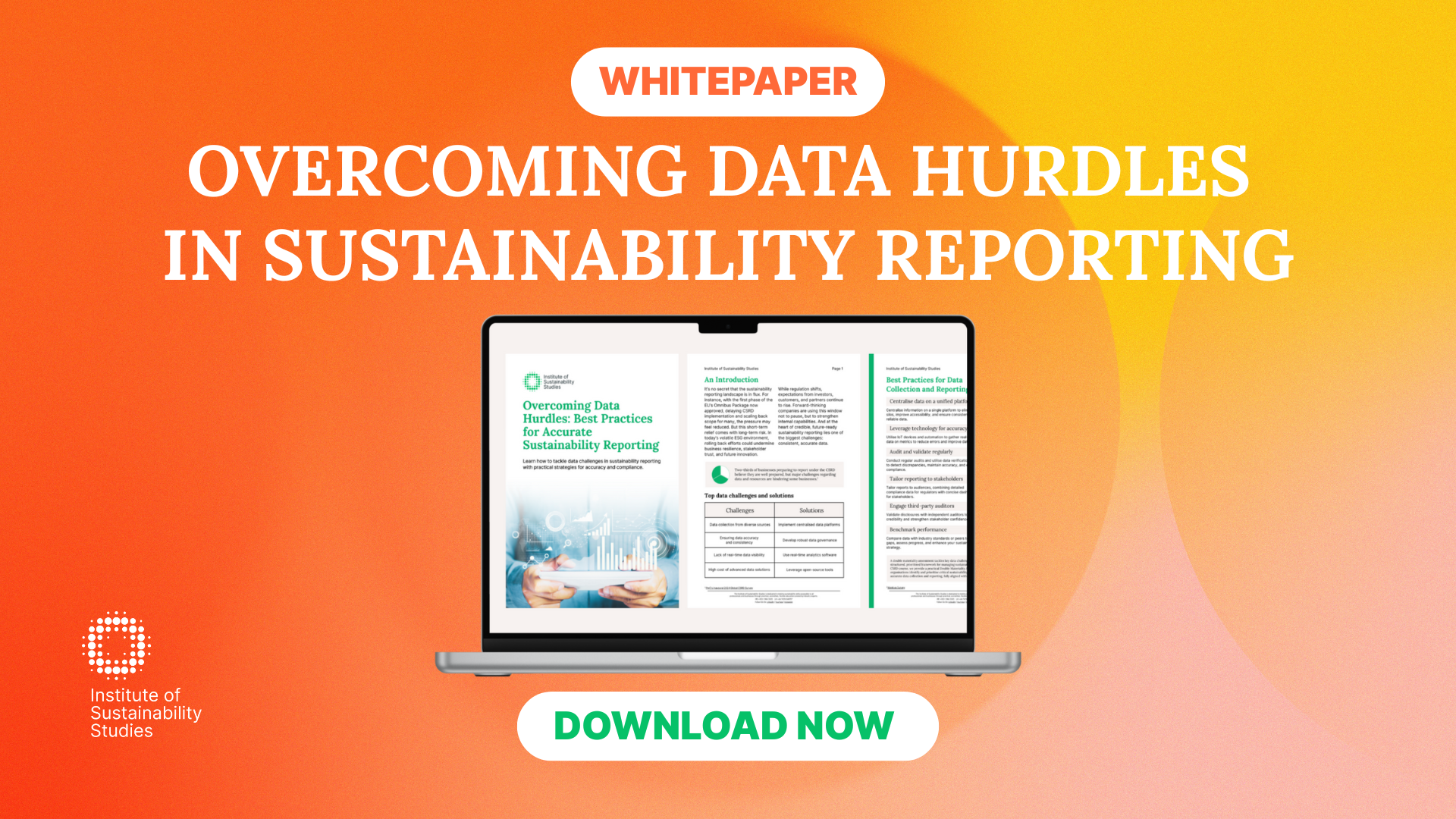Sustainable leadership is becoming an increasingly vital part of any sustainability strategy to address the urgent need for solutions to social, environmental, and economic challenges. It is a holistic approach that goes beyond traditional leadership by fostering collaboration across departments and influencing meaningful change. This approach not only prepares businesses to adapt to current and future challenges but also enhances their long-term viability, competitiveness, and reputation. Below we explore the concept and core principles of sustainable leadership.
What is sustainable leadership?
Sustainability leadership is a management approach that offers solutions for social, environmental, and economic challenges in the world. It recognises leadership as an influence process and deconstructs silos to enable teams and colleagues to work collaboratively across different departments/ offices for transformation and change.
This entails influencing the type of change needed and fostering collaboration across various domains within their workplace. According to a survey from the Sustainability Institute by ERM and GlobeScan, sustainable leadership is measured by evidence of impact, action and above all, the integration of sustainability into business strategy.
The importance of sustainable leadership in the modern business landscape
Sustainable leadership is increasingly recognised as essential in the contemporary business landscape, primarily because it focuses on creating long-term value while preparing for current and future environmental, economic, and social changes.
This foresight helps businesses to adapt and protect themselves from potential disruptions and liabilities associated with environmental and social risks, such as climate change, disruption to supply chains, labour shortages due to climate migration and resource scarcity. These are real-term threats, currently impacting organisations across the planet.
Moreover, sustainable leadership ensures compliance with existing regulations and prepares companies for future legislative changes. This proactive approach meets the growing investor, client and consumer demand for responsible business practices, enhancing competitiveness and investment potential.
For example, many corporate clients are forcing this on their supply chains, eg requiring that key suppliers commit to Science Based Targets, environmental certification or filing with the CDP or GRI. Companies that embody sustainability principles often see higher employee engagement and retention rates, especially among younger workers who value environmental ethics and social justice programmes at their place of work.
This not only helps in attracting and retaining talent but can also boost the company’s public image and brand reputation. Beyond business benefits, sustainable leadership fulfils an ethical obligation to positively impact society and the environment, reinforcing the company’s role as a trustworthy and responsible entity in the global market.
Core principles of sustainable leadership
Sustainable leadership encompasses a range of principles that guide leaders in creating enduring and ethically responsible practices within their organisations. Below are some of the core principles of sustainable leadership.
Visionary thinking
Sustainable leaders possess a clear vision for the long-term future of their organisations that integrates economic, social, and environmental goals. They are not divorced from their heart, they are better equipped because of it. Most of the world’s greatest visionaries and innovators had human benefit and well-being at the centre of their vision.
Think about Marie Curie, Tesla, Ghandi, Ray Anderson, and Mother Theresa: powerhouses who created great visions out of nothing. Real visionary leaders look beyond immediate commercial/ financial gains to understand and prepare for future challenges and opportunities. They incorporate genuine care for the planet and people into their decisions.
Stakeholder inclusiveness
Recognising that various stakeholders (employees, customers, suppliers, communities, and shareholders) have interests in the organisation, sustainability leaders ensure these stakeholders’ voices are heard and truly considered in decision-making processes. Stakeholders often have unspoken ideas and thoughts regarding a business they have a stake in (as employee/ investor/ supplier/ etc).
Perspectives from stakeholders can often be insightful and beneficial to the business, especially if they are involved in similar businesses elsewhere. They might predict market weaknesses/changes or have a valuable observation which could positively impact the strategy or supply chain. Stakeholder engagement can typically involve surveying stakeholder groups as part of developing a strategic plan or for a materiality assessment, in preparation for setting science-based targets.
Informal conversations with individual stakeholders can often produce unforeseen bonuses as well. Cesar Chavez was a stakeholder (a labourer) in the grape-growing industry in California, and became a visionary leader, revolutionising the industry for the better, in the 1980s. He took a stand for his fellow workers and demanded fair working standards, pay and accommodation. The movement he created introduced fair labour laws in California and improved the working lives of tens of thousands of migrant workers.
Adaptability and resilience
Adaptation is built into our human DNA – how else could we have evolved in relationship with our environment? In a rapidly changing world, sustainable leaders are flexible and adaptable, able to adjust strategies in response to climate, social, and economic changes. This resilience is crucial for long-term business sustainability.
Building resilience and adaptability in a business can involve stakeholder engagement (receiving information from different perspectives, some of which might be outliers but highly beneficial), keeping up with industry forecasts (especially where climate change is concerned) and knowing what threats and opportunities lie ahead. Dealing with the threats posed by accelerating climate change is key for business resilience; being flexible enough to adapt to a rapidly shifting market will enable a business to take advantage of potential opportunities.
Ray Anderson, CEO of Interface Carpets famously foresaw the mushrooming problem of waste in the world in the early 1990s and switched the business from manufacturing carpet tile to leasing it. This way, Interface could reclaim waste materials and turn them back into raw materials, thereby saving 100s of millions of dollars in raw materials and diverting 100s of millions of tons of waste carpet tile from incineration/ landfill.
Innovation and continuous improvement
Sustainable leadership involves a commitment to continuous improvement and innovation. This is about finding new and better, holistic ways of doing things, from adapting to climate change to developing sustainable products or services to improving operational processes to reduce social and environmental impacts and increase efficiency. ISO standards (ISO 9001, ISO 14001, etc.) are built around continuous improvement and are designed to drive innovation.
Innovation is like a firework that lights up our soul when we hit on a great idea or a new way of doing things that we know could be a game-changer. 3M Corporation (USA) is built on innovation. They have an entire programme built around allowing staff time to come up with solutions to ‘unfound problems’. Failure is welcomed because that is where the learning occurs. Any programme of continuous improvement and innovation must genuinely allow for failure, knowing that it is essential to growing and evolving.
Systems thinking
Earth is a Whole System, and within this closed system every ecosystem – be it political, natural, commercial or societal – is interdependent. Unfortunately, capitalism does not operate within the rules of this whole system, which has generated accelerating climate change.
Leaders in sustainability understand that organisations are part of larger systems (ecosystems, for example) and consider the broader impacts of their actions, such as water consumption and disposal; creation of waste and disposal thereof; impact on biodiversity; generation of air pollution via transport of goods, etc. They recognise interconnections and potential consequences, which helps to make more holistic and sustainable decisions. Within Systems Thinking, what is generally better for one part is better for the whole.
Collaboration and partnership
Recognising that many sustainability challenges are too large for one entity to tackle alone, sustainable leaders seek partnerships and collaborations with other people and organisations. None of us is as smart as all of us together, and collaboration can eliminate unforeseen problems or issues that one person alone would not have predicted.
Partnering with NGOs, governments, other businesses, and community groups can lead to innovative solutions that benefit all parties. For example, Danone partners with the Ramsar Convention on Wetlands and the International Union for Conservation of Nature to restore natural ecosystems that support disadvantaged rural communities. This sends a message to the public at large and other businesses that Danone takes seriously the collaborative responsibility for the well-being of all on our planet, not just the accounts book.
Summary
The principles of sustainable leadership are essential for businesses aiming to thrive in a rapidly changing world. By embedding sustainability into their core principles, companies can address significant environmental and social risks, comply with evolving regulations, and meet the growing demands of stakeholders.
Companies like Danone, Interface Carpets, and 3M demonstrate how sustainable leadership not only fosters resilience and innovation but also enhances employee engagement and public trust. Ultimately, sustainable leadership positions businesses to create long-term value while fulfilling their ethical obligations to society and the environment.
_____
Want to read more top voices?
- The role of technology in sustainable development
- Building momentum for change: Sustainable leadership strategies that create impact
Michele Hallahan, MSc, ALCM, LEED AP, has worked in the fields of ecological design, environmental management and sustainability for over twenty years. Specialising in restorative environmental management and international environmental standards both in the United States and in Europe. She now consults with medium to large businesses on all matters related to sustainability.
She served as Vice President of internationally renowned ecological designer Dr. John Todd’s firm, JTED, and is a certified Permaculture Designer. She was the Sustainability Advisor to the Office of the Provost at Trinity College, Dublin. She taught on climate change and sustainability in the Environmental Engineering and Business schools at Trinity College and is a guest lecturer at UCD.
- Michele Hallahanhttps://instituteofsustainabilitystudies.com/insights/author/michele/









